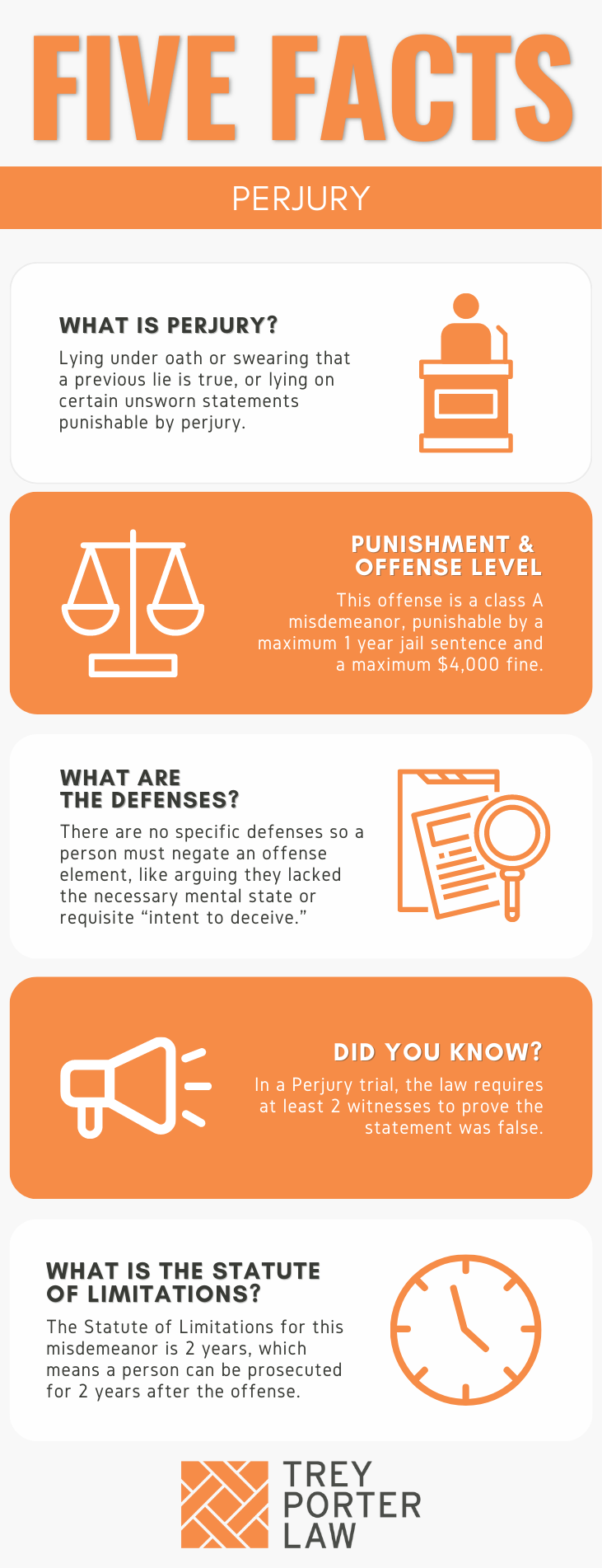WHAT IS PERJURY IN TEXAS?
The Texas law against perjury prohibits: (1) making a false statement under oath, with intent to deceive, and with knowledge of the statement’s meaning; (2) swearing to the truth of a false statement previously made under oath; or (3) making a false unsworn declaration.
WHAT IS THE PERJURY LAW IN TEXAS?
Tex. Penal Code § 37.02. PERJURY.
(a) A person commits an offense if, with intent to deceive and with knowledge of the statement’s meaning:
(1) he makes a false statement under oath or swears to the truth of a false statement previously made and the statement is required or authorized by law to be made under oath; or
(2) he makes a false unsworn declaration under Chapter 132, Civil Practice and Remedies Code.
(b) An offense under this section is a Class A misdemeanor.
Tex. Penal Code § 37.07. IRREGULARITIES NO DEFENSE.
(a) It is no defense to prosecution under Section 37.02 (Perjury) or 37.03 (Aggravated Perjury) that the oath was administered or taken in an irregular manner, or that there was some irregularity in the appointment or qualification of the person who administered the oath.
(b) It is no defense to prosecution under Section 37.02 (Perjury) or 37.03 (Aggravated Perjury) that a document was not sworn to if the document contains a recital that it was made under oath, the declarant was aware of the recital when he signed the document, and the document contains the signed jurat of a public servant authorized to administer oaths.
WHAT IS THE PENALTY CLASS FOR PERJURY IN TEXAS?
Perjury is a Class A misdemeanor, punishable by up to one year in county jail.
WHAT IS THE PUNISHMENT RANGE FOR PERJURY IN TEXAS?
The punishment range for perjury, a Class A misdemeanor, is up to one year in jail, and up to a $4,000 fine.
WHAT ARE THE PENALTIES FOR PERJURY IN TEXAS?
As an alternative to jail time, a person charged with perjury may be placed on probation after a conviction, or deferred adjudication without a conviction, for up to two years.
WHAT ARE THE DEFENSES TO PERJURY IN TEXAS?
The statute does not provide specific defenses to perjury, so a person accused of perjury may attempt to negate one of the elements the State must prove beyond a reasonable doubt. For example, the State must prove an accused swore to a false statement with intent to deceive, and knew the statement was false or misleading.
- What if the alleged false statement in a perjury prosecution is literally true? In Texas, there is no “literal truth” defense to perjury, because the statute requires proof of intent to deceive.In Bell v. State, the defendant, a judge, was accused of ethical violations by an acquaintance. While he was presiding over a lawsuit against Chevron, he told the acquaintance several times “they,” meaning Chevron, “have a friend in me.” In a hearing before the Commission on Judicial Conduct, he was asked if he said “Chevron needed to know you were its friend.” He denied saying “those things,” and was charged with aggravated perjury. While he did not use the exact language about which he was asked, his denial was misleading to deceive the commission. 26 S.W.3d 516 (Tex. App.—Houston [1st Dist.] 2000, pet. ref’d).
- How many witnesses must testify in a perjury prosecution? If a defendant in a perjury trial is accused of making a false statement, at least two witnesses must prove the statement was false.
WHAT IS THE STATUTE OF LIMITATIONS FOR PERJURY IN TEXAS?
The limitation period for perjury, a Class A misdemeanor, is two years.
PERJURY IN TEXAS
A person commits perjury if, with intent to deceive and with knowledge of the statement’s meaning, he makes a false statement under oath. Perjury is often committed by swearing to false statements in an official document, such as an affidavit.
TEXAS PERJURY COURT CASES
The case law regarding perjury in Texas shows, in addition to fact assertions, a person may be charged with perjury for giving an opinion or statement of belief if the person holds no such opinion or belief.
In Hardy v. State, the defendant, a police officer, stated in a probable cause affidavit he believed the suspect was legally intoxicated. The suspect was charged with a DWI based on the officer’s sworn statements. However, the night he wrote the affidavit, he told several people he did not truly believe the suspect was intoxicated. Because the officer swore he believed something he did not, he committed perjury. 246 S.W.3d 290 (Tex. App.—Houston [14th Dist.] 2008, pet. ref’d).

















